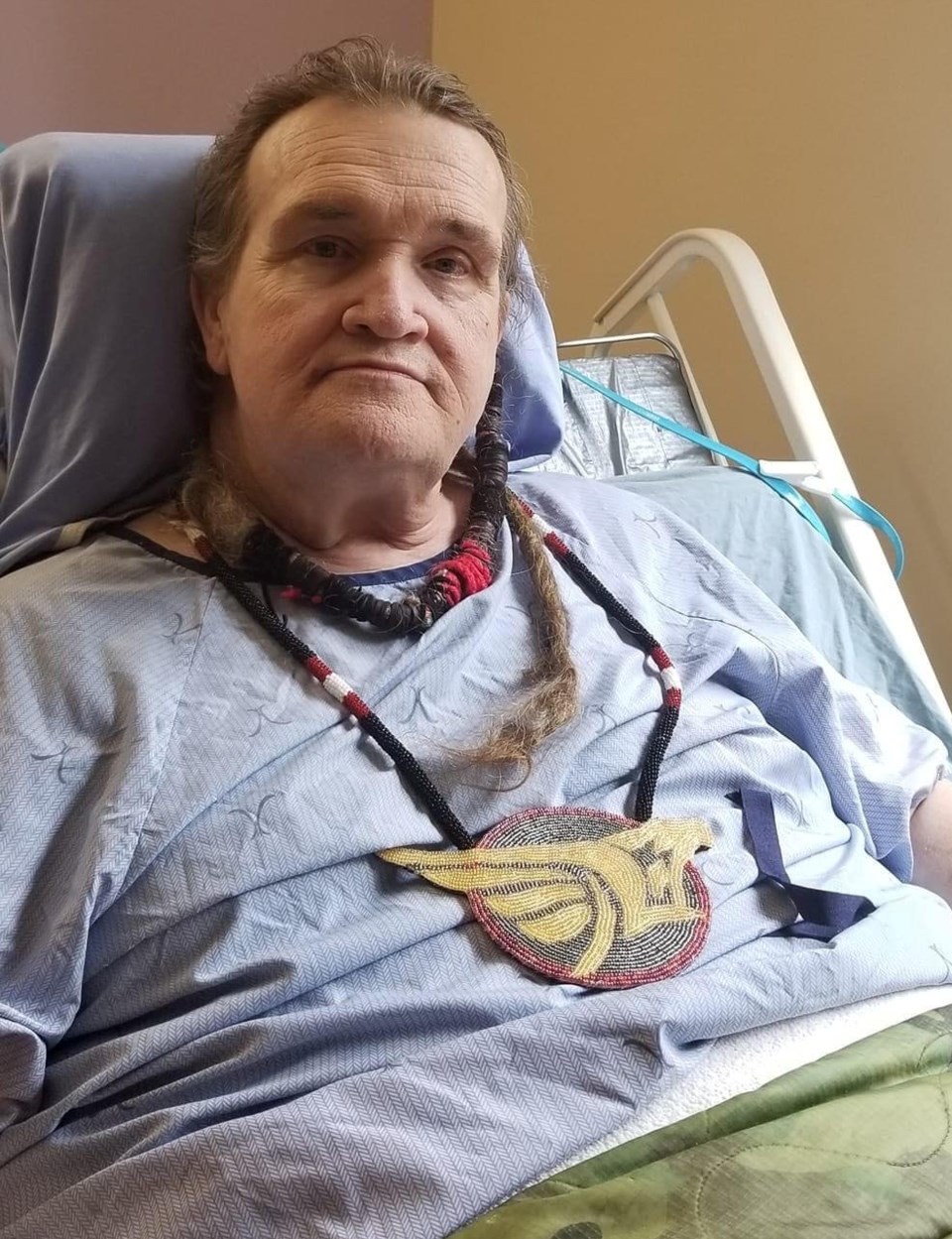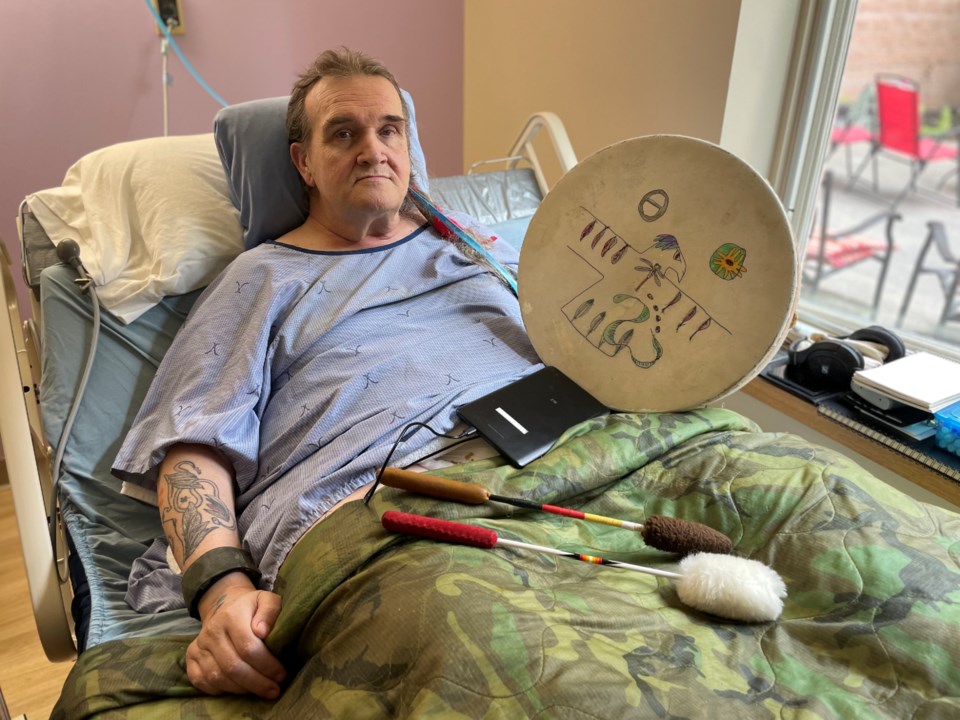This article was first published by OrilliaToday, as part of a series where the news outlet looks back at some of the biggest news stories of the year in the community.
The COVID-19 pandemic shone a harsh spotlight on all that was wrong inside Canada’s long-term care homes.
But many will tell you it was not a new problem, just one that hit the public’s radar when so many seniors died amid unconscionable conditions in understaffed facilities.
Orillia’s Dav Langstroth, sadly, became a public, local example of what is wrong within these facilities.
Exasperated by the conditions inside the Leacock Care Centre, he took the bold step of taking his sad situation to the public when he contacted us. On May 24, he told OrilliaMatters about how he had to sit in his own excrement overnight due to a chronic lack of personal support workers in the facility.
Langstroth, 69, suffered from incontinence and no longer had the ability to use his lower body. He sat in his waste from 10:30 p.m. on May 22 until 6 a.m. on May 23, when he finally received the care he needed.
He said a shortage of staff led to the situation, adding it typically requires two people to change him.
“I had a bowel movement, rang the call bell; staff came in,” he explained. “The night (personal support worker) said, ‘I can’t change you because I don’t have another person to help me.’”
Staff apologized to him the following morning, he said, but he questioned why there were not enough workers present to address his needs.
Langstroth had stayed at the for-profit home since December 2022. He said he has previously had to wait up to a couple of hours to be changed, but May 22 was the “straw that broke the camel’s back.”
“I’m finding this to be a situation where it’s no longer tenable for me,” he said. “There have been other nights, many nights, when people couldn’t change me because, again, (there’s) one person on.”
He suffered both mental and physical anguish as a result of the incident, as his waste became like a “mild acid” on his body, causing pain and discomfort, which led to an “extremely painful” process when he finally received care.
He said he had few issues with the staff at Leacock Care Centre, noting they do their best to carry out their work under trying circumstances.
“They’re usually pretty much on the ball,” he said. “It can be two, three hours sometimes because staff are busy (with) other people … Last night, it was eight hours, basically, and I’m finding that not tenable. It’s damaging to me physically and mentally.”
However, he questioned what was being done at the administrative level.

“There are people that are burning out left, right and centre,” he said of front-line staff.
He said he decided to speak out on the situation on behalf of others, as well, who might have difficulty advocating for themselves.
“It’s dehumanizing, but (this is) not so much for me. It’s for all the other people that can’t make that communication,” he said. “If that level of care is not being done for me, what is not being done for other people who don’t have a voice?”
Trevor Sykes, community relations co-ordinator for Jarlette Health Services, said the company takes every complaint seriously.
“Our primary concern, each and every day, is the health, safety and well-being of our residents,” he told OrilliaMatters in a statement. “We take every complaint and concern brought to our attention very seriously. We are not able to comment on the personal care of individual residents.”
However, he said an investigation had been undertaken in response to complaints made by a resident.
Three days after the story broke, Paul Calandra, Ontario’s then-minister of long-term care, said the conditions described at the facility “are unacceptable.”
“The Ministry of Long-Term Care will be conducting an inspection of the home to ensure any and all instances of non-compliance are corrected as quickly as possible,” Calandra said in a statement.
“Any home that fails to meet the care standards set out in the Fixing Long-Term Care Act is subject to corrective actions, including written notifications, administrative monetary penalties, and compliance orders.
“Repeated instances of non-compliance will result in escalating penalties, which could include mandatory management and cease of admissions orders.”
Langstroth confirmed Leacock Care Centre staff were in contact with him regarding the incident, and he said numerous people have reached out to him to show support since it happened.
“They’re doing damage control, as opposed to reaching out to me and saying, ‘Do you have any suggestions? Can I be part of the process?’ That would be wonderful,” he said of the home’s response to the incident.
He also hoped to “make people accountable.”
Four months after the minister’s public statement, the province announced it had found five violations at the Orillia facility.
The inspection took place across seven on- and off-site visits between June 7 and 19, finding five instances of non-compliance with the act in relation to three residents at the home.
For one resident, identified as resident #003 in the report, the ministry found the home failed to protect the resident from neglect as “care was not provided to the resident for an extended period of time,” resulting in “moderate impact and risk to the resident.”
The ministry also found the home failed to identify the level of assistance required in the resident’s plan of care, with regard to the resident’s continence care, and that it failed to implement a “specified intervention” in several instances of the resident’s care.
For residents identified as #001 and #002, the ministry found the home failed to provide the appropriate amount of continence care to ensure they were “clean, dry and comfortable,” and that specified products for continence care were not provided to them.
The home also failed to ensure resident #001’s specific continence care requirements were included in the plan of care.
Langstroth found the level of care he received improved greatly over the month following the incident, but he said that level of care was not upheld over the summer.
“For about a month afterwards, I would get somebody at my door, when I hit the call bell, usually within 30 seconds,” he said. “Since that month has passed, it’s getting more and more ... 15 minutes, half an hour, 45 minutes.”
The Fixing Long-Term Care Act prescribed a goal of providing long-term care residents with three hours, 15 minutes of care per day by March 31 — a threshold Langstroth did not believe was being met.
“In this building, each resident is required to have 3.25 hours of care per 24 hours. Do the math. How many people do you need in order to do that? There aren’t enough,” he said. “They are unable to do that. The reason is they can’t get enough people to do the job.”
Langstroth said he was committed to being a voice for residents who cannot speak out for themselves.
“I have no ability to make change. However, what I can do is ensure that the people who can’t speak have a speaker on their behalf,” he said. “Those that don’t know who they are, where they are, what they’re doing, why they’re here — a lot of them are crying because they figure that they’ve been abandoned.”
For Langstroth, due to several health issues, he lived confined in his bed, and opted for medical assistance in dying (MAID).
Beyond the problems at the Leacock Care Centre, or any other long-term care home, he said his end-of-life issues exemplified a fundamental break in the circle of life — in which the old take care of their young, and vice versa.
“There is a circle of life, in that the elders look after the youngers, who look after the adolescents, who then start to care for the parents as the parents start to become elders. If ever there was a time to examine that circle of life — right now, the circle is broken,” Langstroth said this week.
“The circle of life, as we know it, is broken beyond repair.”
He raised issues with sequestering the elderly from the rest of the population and also highlighted the fact some are provided with care beyond a reasonable point — when their lives consist mostly of suffering.
“The level of staffing has gotten so poor … that (long-term care) is a death factory,” he said. “I hate that idea. There should be schools where people that have youth and energy are taught by people with age and wisdom. That’s ideal. It’s something that’s always been in my mind.”
On Oct. 23, an Indigenous elder helped see him through the MAID process.
As he prepared for death, Langstroth urged others to care for their elders, and he said he has been so outspoken about long-term care with the hope that others will be inspired when he is gone.
“Always, always care for your elders — no matter what it takes. Maybe somebody else will listen. Maybe somebody else will pick up the torch and say, ‘I can make a difference,’” he said.
“The circle has become broken, and all of those sections that are broken need to be fixed, and they need to be fixed, individually, at the same time. It will take a huge amount of money — actions by governments, collectively — and that’s the way it has to be done.”




